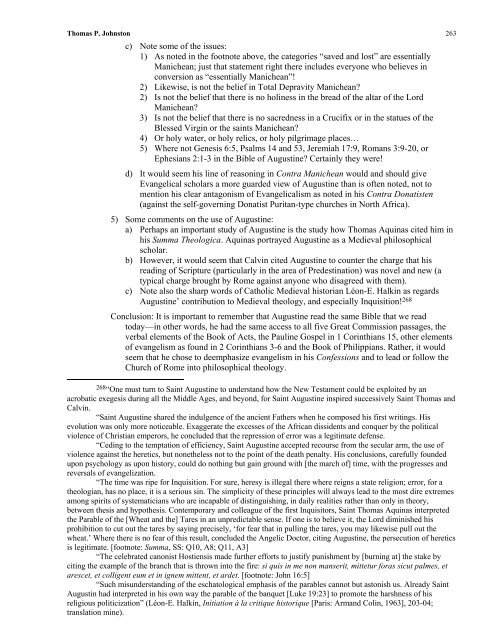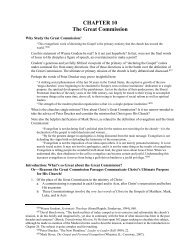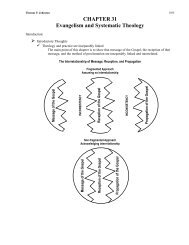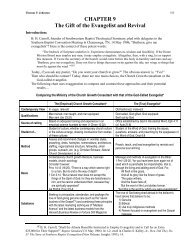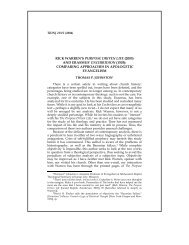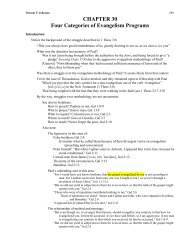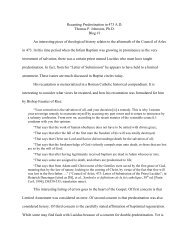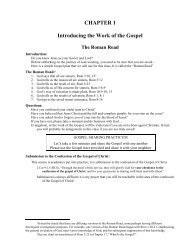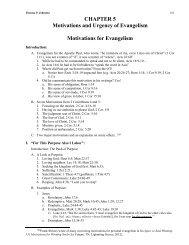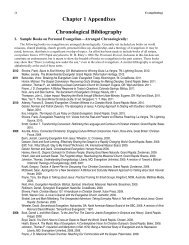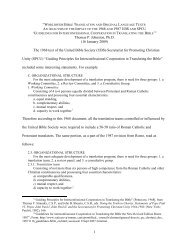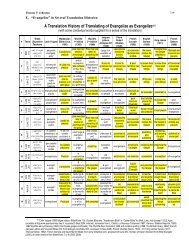CHAPTER 7 Defining Evangelizing - Evangelism Unlimited
CHAPTER 7 Defining Evangelizing - Evangelism Unlimited
CHAPTER 7 Defining Evangelizing - Evangelism Unlimited
You also want an ePaper? Increase the reach of your titles
YUMPU automatically turns print PDFs into web optimized ePapers that Google loves.
Thomas P. Johnston 263<br />
c) Note some of the issues:<br />
1) As noted in the footnote above, the categories “saved and lost” are essentially<br />
Manichean; just that statement right there includes everyone who believes in<br />
conversion as “essentially Manichean”!<br />
2) Likewise, is not the belief in Total Depravity Manichean?<br />
2) Is not the belief that there is no holiness in the bread of the altar of the Lord<br />
Manichean?<br />
3) Is not the belief that there is no sacredness in a Crucifix or in the statues of the<br />
Blessed Virgin or the saints Manichean?<br />
4) Or holy water, or holy relics, or holy pilgrimage places…<br />
5) Where not Genesis 6:5, Psalms 14 and 53, Jeremiah 17:9, Romans 3:9-20, or<br />
Ephesians 2:1-3 in the Bible of Augustine? Certainly they were!<br />
d) It would seem his line of reasoning in Contra Manichean would and should give<br />
Evangelical scholars a more guarded view of Augustine than is often noted, not to<br />
mention his clear antagonism of Evangelicalism as noted in his Contra Donatisten<br />
(against the self-governing Donatist Puritan-type churches in North Africa).<br />
5) Some comments on the use of Augustine:<br />
a) Perhaps an important study of Augustine is the study how Thomas Aquinas cited him in<br />
his Summa Theologica. Aquinas portrayed Augustine as a Medieval philosophical<br />
scholar.<br />
b) However, it would seem that Calvin cited Augustine to counter the charge that his<br />
reading of Scripture (particularly in the area of Predestination) was novel and new (a<br />
typical charge brought by Rome against anyone who disagreed with them).<br />
c) Note also the sharp words of Catholic Medieval historian Léon-E. Halkin as regards<br />
Augustine’ contribution to Medieval theology, and especially Inquisition! 268<br />
Conclusion: It is important to remember that Augustine read the same Bible that we read<br />
today—in other words, he had the same access to all five Great Commission passages, the<br />
verbal elements of the Book of Acts, the Pauline Gospel in 1 Corinthians 15, other elements<br />
of evangelism as found in 2 Corinthians 3-6 and the Book of Philippians. Rather, it would<br />
seem that he chose to deemphasize evangelism in his Confessions and to lead or follow the<br />
Church of Rome into philosophical theology.<br />
268 “One must turn to Saint Augustine to understand how the New Testament could be exploited by an<br />
acrobatic exegesis during all the Middle Ages, and beyond, for Saint Augustine inspired successively Saint Thomas and<br />
Calvin.<br />
“Saint Augustine shared the indulgence of the ancient Fathers when he composed his first writings. His<br />
evolution was only more noticeable. Exaggerate the excesses of the African dissidents and conquer by the political<br />
violence of Christian emperors, he concluded that the repression of error was a legitimate defense.<br />
“Ceding to the temptation of efficiency, Saint Augustine accepted recourse from the secular arm, the use of<br />
violence against the heretics, but nonetheless not to the point of the death penalty. His conclusions, carefully founded<br />
upon psychology as upon history, could do nothing but gain ground with [the march of] time, with the progresses and<br />
reversals of evangelization.<br />
“The time was ripe for Inquisition. For sure, heresy is illegal there where reigns a state religion; error, for a<br />
theologian, has no place, it is a serious sin. The simplicity of these principles will always lead to the most dire extremes<br />
among spirits of systematicians who are incapable of distinguishing, in daily realities rather than only in theory,<br />
between thesis and hypothesis. Contemporary and colleague of the first Inquisitors, Saint Thomas Aquinas interpreted<br />
the Parable of the [Wheat and the] Tares in an unpredictable sense. If one is to believe it, the Lord diminished his<br />
prohibition to cut out the tares by saying precisely, ‘for fear that in pulling the tares, you may likewise pull out the<br />
wheat.’ Where there is no fear of this result, concluded the Angelic Doctor, citing Augustine, the persecution of heretics<br />
is legitimate. [footnote: Summa, SS: Q10, A8; Q11, A3]<br />
“The celebrated canonist Hostiensis made further efforts to justify punishment by [burning at] the stake by<br />
citing the example of the branch that is thrown into the fire: si quis in me non manserit, mittetur foras sicut palmes, et<br />
arescet, et colligent eum et in ignem mittent, et ardet. [footnote: John 16:5]<br />
“Such misunderstanding of the eschatological emphasis of the parables cannot but astonish us. Already Saint<br />
Augustin had interpreted in his own way the parable of the banquet [Luke 19:23] to promote the harshness of his<br />
religious politicization” (Léon-E. Halkin, Initiation à la critique historique [Paris: Armand Colin, 1963], 203-04;<br />
translation mine).


